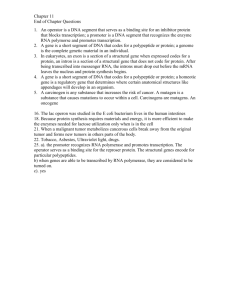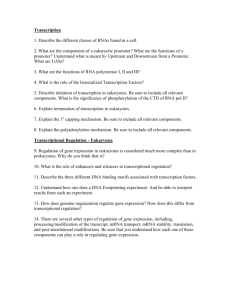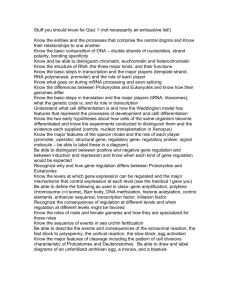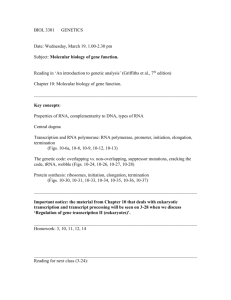Map
advertisement
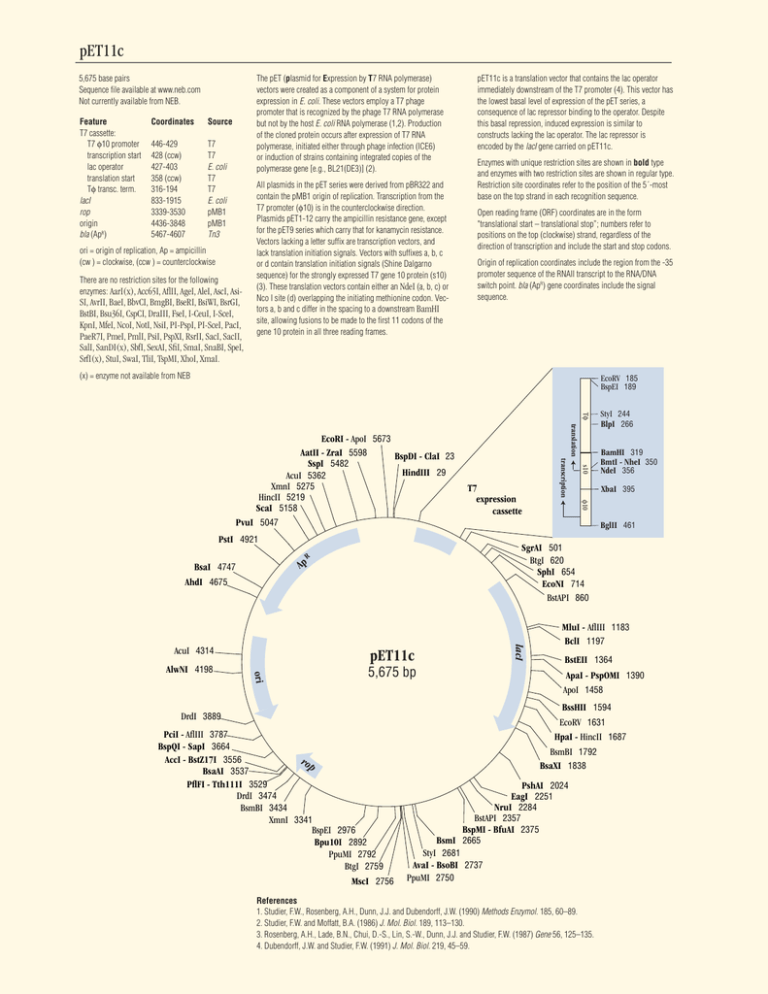
pET11c The pET (plasmid for Expression by T7 RNA polymerase) vectors were created as a component of a system for protein expression in E. coli. These vectors employ a T7 phage promoter that is recognized by the phage T7 RNA polymerase but not by the host E. coli RNA polymerase (1,2). Production of the cloned protein occurs after expression of T7 RNA polymerase, initiated either through phage infection (ICE6) or induction of strains containing integrated copies of the polymerase gene [e.g., BL21(DE3)] (2). 5,675 base pairs Sequence file available at www.neb.com Not currently available from NEB. Feature T7 cassette: T7 φ10 promoter transcription start lac operator translation start Tφ transc. term. lacI rop origin bla (ApR) Coordinates Source 446-429 428 (ccw) 427-403 358 (ccw) 316-194 833-1915 3339-3530 4436-3848 5467-4607 T7 T7 E. coli T7 T7 E. coli pMB1 pMB1 Tn3 ori = origin of replication, Ap = ampicillin (cw ) = clockwise, (ccw ) = counterclockwise There are no restriction sites for the following enzymes: AarI(x), Acc65I, AflII, AgeI, AleI, AscI, Asi- SI, AvrII, BaeI, BbvCI, BmgBI, BseRI, BsiWI, BsrGI, BstBI, Bsu36I, CspCI, DraIII, FseI, I-CeuI, I-SceI, KpnI, MfeI, NcoI, NotI, NsiI, PI-PspI, PI-SceI, PacI, PaeR7I, PmeI, PmlI, PsiI, PspXI, RsrII, SacI, SacII, SalI, SanDI(x), SbfI, SexAI, SfiI, SmaI, SnaBI, SpeI, SrfI(x), StuI, SwaI, TliI, TspMI, XhoI, XmaI. All plasmids in the pET series were derived from pBR322 and contain the pMB1 origin of replication. Transcription from the T7 promoter (φ10) is in the counterclockwise direction. Plasmids pET1-12 carry the ampicillin resistance gene, except for the pET9 series which carry that for kanamycin resistance. Vectors lacking a letter suffix are transcription vectors, and lack translation initiation signals. Vectors with suffixes a, b, c or d contain translation initiation signals (Shine Dalgarno sequence) for the strongly expressed T7 gene 10 protein (s10) (3). These translation vectors contain either an NdeI (a, b, c) or Nco I site (d) overlapping the initiating methionine codon. Vectors a, b and c differ in the spacing to a downstream BamHI site, allowing fusions to be made to the first 11 codons of the gene 10 protein in all three reading frames. pET11c is a translation vector that contains the lac operator immediately downstream of the T7 promoter (4). This vector has the lowest basal level of expression of the pET series, a consequence of lac repressor binding to the operator. Despite this basal repression, induced expression is similar to constructs lacking the lac operator. The lac repressor is encoded by the lacI gene carried on pET11c. Enzymes with unique restriction sites are shown in bold type and enzymes with two restriction sites are shown in regular type. Restriction site coordinates refer to the position of the 5´-most base on the top strand in each recognition sequence. Open reading frame (ORF) coordinates are in the form "translational start – translational stop”; numbers refer to positions on the top (clockwise) strand, regardless of the direction of transcription and include the start and stop codons. Origin of replication coordinates include the region from the -35 promoter sequence of the RNAII transcript to the RNA/DNA switch point. bla (ApR) gene coordinates include the signal sequence. (x) = enzyme not available from NEB EcoRV 185 BspEI 189 TF translation s10 XbaI 395 PvuI 5047 BglII 461 PstI 4921 SgrAI 501 BtgI 620 SphI 654 EcoNI 714 BstAPI 860 R Ap BsaI 4747 AhdI 4675 ori AlwNI 4198 pET11c pET11c 5,675 bp 5675 bp lacI AcuI 4314 BamHI 319 BmtI - NheI 350 NdeI 356 F10 T7 expression cassette transcription EcoRI - ApoI 5673 AatII - ZraI 5598 BspDI - ClaI 23 SspI 5482 HindIII 29 AcuI 5362 XmnI 5275 HincII 5219 ScaI 5158 StyI 244 BlpI 266 BstEII 1364 ApaI - PspOMI 1390 ApoI 1458 BssHII 1594 EcoRV 1631 HpaI - HincII 1687 BsmBI 1792 BsaXI 1838 DrdI 3889 PciI - AflIII 3787 BspQI - SapI 3664 AccI - BstZ17I 3556 rop BsaAI 3537 PflFI - Tth111I 3529 DrdI 3474 BsmBI 3434 XmnI 3341 BspEI 2976 Bpu10I 2892 PpuMI 2792 BtgI 2759 MscI 2756 MluI - AflIII 1183 BclI 1197 PshAI 2024 EagI 2251 NruI 2284 BstAPI 2357 BspMI - BfuAI 2375 BsmI 2665 StyI 2681 AvaI - BsoBI 2737 PpuMI 2750 References 1. Studier, F.W., Rosenberg, A.H., Dunn, J.J. and Dubendorff, J.W. (1990) Methods Enzymol. 185, 60–89. 2. Studier, F.W. and Moffatt, B.A. (1986) J. Mol. Biol. 189, 113–130. 3. Rosenberg, A.H., Lade, B.N., Chui, D.-S., Lin, S.-W., Dunn, J.J. and Studier, F.W. (1987) Gene 56, 125–135. 4. Dubendorff, J.W. and Studier, F.W. (1991) J. Mol. Biol. 219, 45–59.
